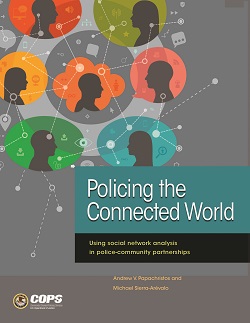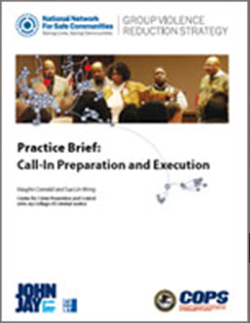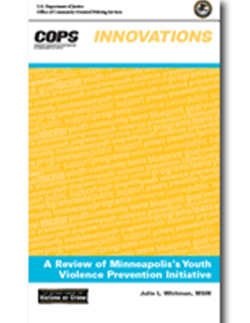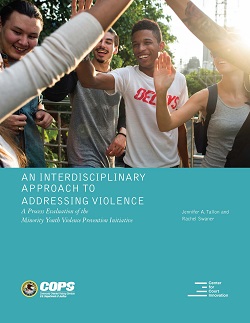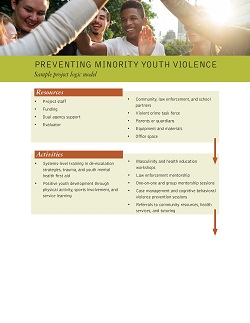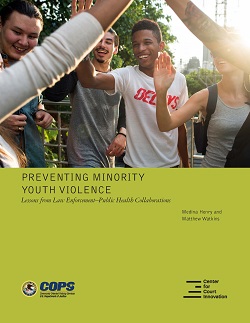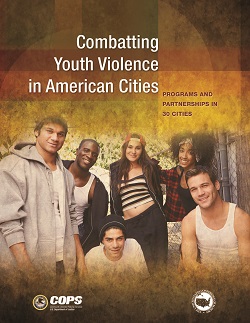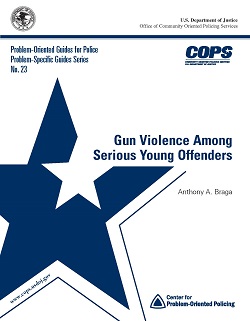In May 2021, the Department of Justice announced a Comprehensive Strategy for Reducing Violent Crime. As part of that effort, the COPS Office participates in the Violent Crime Reduction Steering Committee, a cross-component working group that seeks to work both within the Department and with interagency partners to “discuss initiatives and potential joint efforts to reduce violent crime.” The COPS Office will also target its grant funds to projects that directly engage with these issues, partnering with law enforcement agencies, academia, and the non-profit sector to develop new strategies and approaches to community violence intervention (CVI) and violence reduction. COPS will also leverage existing resources, such as research and publications examining violence reduction efforts and their effectiveness, training opportunities and grants, and technical assistance delivered through CRI-TAC. Other components, including the Office of Justice Programs, are also focusing efforts and funding on community violence intervention programs.
One of the core principles of the Department’s strategy for reducing violent crime—in addition to fostering trust and having legitimacy in the communities we serve, setting strategic enforcement priorities, and measuring the results of our efforts—is investing in community-based prevention and intervention programs. In recent years, community organizations have developed innovative approaches to intervening in the lives of those at the highest risk of engaging in or becoming victims of violence. Experience and research have shown, moreover, that prevention and intervention can be highly effective complements to the strategic enforcement of criminal laws. Although these kinds of programs are almost always best coordinated by local community and government partners, the Department can play a significant role in supporting them through grant funding, training, and technical assistance. We can also share our enforcement experience to help inform prevention and intervention approaches. These are important investments that will promote public safety in communities across the country.
Piloting Innovative Community Violence Intervention Strategies
In June 2021, President Biden announced that the Administration would convene and support a CVI Collaborative of more than a dozen jurisdictions that are committing to use a portion of their American Rescue Plan (ARP) funding or other public funding to increase investment in CVI, including to anticipate and respond to the potential rise in violence this summer. The Administration will convene meetings with officials from these communities, facilitate peer-to-peer learning, and provide technical assistance.
As part of its focus on violence reduction across the nation, the Department of Justice, including the COPS Office, will support the efforts in these jurisdictions through training and technical assistance and grantmaking. The work with those particular jurisdictions is part of the broader work that the COPS Office has undertaken and will continue to undertake in its focus on violence reduction.
These cities include:
|
|
|
Leveraging Existing COPS Grant Programs
Community Policing Development (CPD) Microgrants
DOJ included CVI as a topic area in its FY21 Community Policing Development (CPD) Microgrants, a $3 million program that supports innovative community policing strategies. The solicitation was opened on May 20, 2021 and closed on July 8, 2021. Awards will be made by September 30, 2021.
COPS Hiring Program (CHP)
DOJ made CVI a priority focus area in its FY21 COPS Hiring Program (CHP), a $156 million competitive grant program that funds entry-level law enforcement officers. Law enforcement agencies that partner with community organizations to implement community violence intervention strategies will receive preference points in the scoring of applications. The solicitation was opened on May 7, 2021 and closed on June 22, 2021. Awards will be made by September 30, 2021.
School Violence Prevention Program (SVPP)
DOJ supported CVI in its FY21 School Violence Prevention Program (SVPP), a $53 million competitive grant program that funds equipment, technology, and training to address school violence. Applicants that have experienced high rates of gun violence will receive priority, with an emphasis on wraparound services for students most likely to engage in or be victimized by gun violence. The solicitation was opened on May 7, 2021 and closed on June 22, 2021. Awards will be made by September 30, 2021.
Webinars
As part of the Administration’s efforts to support communities seeking to implement or expand CVI efforts, subject matter experts will present on CVI-related topics in a series of webinars. This webinar series, convened by the White House Domestic Policy Council, is a joint effort of the U.S. Department of Justice, the U.S. Department of Health and Human Services, the U.S. Department of Housing and Urban Development, the U.S. Department of Labor, and the U.S. Department of Education.
Part 1: Evidence-based Theory and Research on CVI – Wednesday, June 23, 2021
The first webinar, “Community Violence Intervention (CVI) Webinar Series Part 1: Evidence-based Theory and Research on CVI” took place on Wednesday, June 23, 2021 at 1:00–2:30 p.m. ET. In this webinar, presenters discussed immediate steps communities can take to reduce community violence as well as the social determinants of health (e.g., norms, policies) that can lead to inequities in violence. Within this framework, presenters defined CVI, including the theory and research behind specific CVI models such as street outreach, violence interrupters, group violence interventions, and hospital-based interventions, as well as the role of the community and law enforcement within CVI.
Part 2: Place-based Approaches to CVI - Wednesday, July 21, 2021
The second webinar, “Community Violence Intervention (CVI) Webinar Series Part 2: Place-based Approaches to CVI,” took place on Wednesday, July 21, 2021 at 1:00-2:30 p.m. ET. During this webinar, presenters discussed CVI efforts in the context of a place-based approach. Framed in the social ecological model, place-based approaches can reduce and prevent community violence and crime by enhancing and maintaining the physical characteristics of settings where people come together in order to foster social interaction, strengthen connectedness, and increase collective efficacy (e.g., shared trust among residents and willingness to intervene). Presenters highlighted the importance of community engagement within place-based approaches and discussed how incorporating community revitalization efforts, such as increasing green spaces and addressing how abandoned buildings can reduce and prevent community violence.
Part 3: CVI In Practice - Wednesday, August 18, 2021
The third webinar, “Community Violence Intervention (CVI) Webinar Series Part 3: CVI in Practice” took place on Wednesday, August 18, 2021 at 1:00–2:30 p.m. ET. During this webinar, leading CVI experts shared their on-the-ground experiences on how to implement CVI strategies within communities. This conversational panel featured Anthony Smith from Cities United, Fatimah Loren Dreier from the Health Alliance for Violence Intervention (HAVI), Anne Marks from Youth ALIVE!, and Ray Winans from Detroit Live. They shared insights on what communities can consider in order to effectively implement and sustain CVI efforts.
Part 4: Community-Centered Evaluation - Thursday, September 16, 2021
The fourth webinar, “Community Violence Intervention (CVI) Webinar Series Part 4: Community-Centered Evaluation” took place on Thursday, September 16, 2021 at 1:00–2:30 p.m. ET. During this webinar, leading experts in program evaluation discussed partnerships and evaluation, including process and outcome evaluations, and ways to partner with community members in order to understand whether CVIs are working to reduce violence. In particular, the webinar covered the benefits of community-based participatory research, a community-centered strategy that involves partnering with a researcher in an iterative process of program development and improvement. The webinar also included information about a wide range of resources for practitioners interested in conducting community-centered evaluations.
COPS CVI Publications and Resources
The COPS Office website hosts numerous resources and deliverables on a wide variety of public safety topics. These include several deliverables related to CVI efforts:
Collaborative Reform Initiative Technical Assistance Center (CRI-TAC)
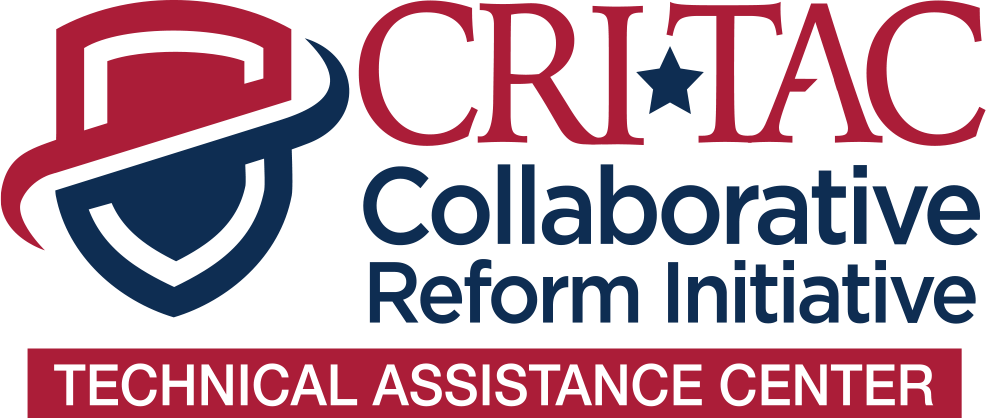
The COPS Office technical assistance program, Collaborative Reform Initiative for Technical Assistance Center (CRI-TAC), serve as the primary vehicle for timely and direct request-and-deliver assistance to law enforcement agencies in need of consultation, narrowly scope policy and practice reviews, and training. More than 30 topics are covered by a consortium of national-level law enforcement stakeholder associations, subject matter experts, and training providers. As directed by COPS Office leadership, any topic area can be covered through CRI-TAC including those to assist local law enforcement agencies with implementing Community Violence Intervention efforts and initiatives. To date, the COPS Office has received over 500 inquiries for technical assistance and has completed over 350 engagements with local law enforcement agencies.
 Official websites use.gov
Official websites use.gov Secure .gov websites use HTTPS
Secure .gov websites use HTTPS 



